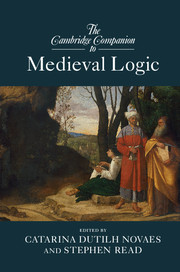Book contents
- Frontmatter
- Contents
- List of Contributors
- Introduction
- PART I PERIODS AND TRADITIONS
- 1 The Legacy of Ancient Logic in the Middle Ages
- 2 Arabic Logic up to Avicenna
- 3 Arabic Logic after Avicenna
- 4 Latin Logic up to 1200
- 5 Logic in the Latin Thirteenth Century
- 6 Logic in the Latin West in the Fourteenth Century
- 7 The Post- Medieval Period
- PART II THEMES
- Bibliography
- Index
2 - Arabic Logic up to Avicenna
from PART I - PERIODS AND TRADITIONS
Published online by Cambridge University Press: 05 September 2016
- Frontmatter
- Contents
- List of Contributors
- Introduction
- PART I PERIODS AND TRADITIONS
- 1 The Legacy of Ancient Logic in the Middle Ages
- 2 Arabic Logic up to Avicenna
- 3 Arabic Logic after Avicenna
- 4 Latin Logic up to 1200
- 5 Logic in the Latin Thirteenth Century
- 6 Logic in the Latin West in the Fourteenth Century
- 7 The Post- Medieval Period
- PART II THEMES
- Bibliography
- Index
Summary
In this chapter we discuss, first, how the Arabic logicians up to the end of the tenth century took over Greek material and added to it material of their own and how they reshaped the subject of logic in the process. We have included references to the young Averroes, although he wrote in the twelfth century, inasmuch as he belongs in the tradition of al-Fārābī (d. 950). After this we turn to the formal innovations of Avicenna's in the early eleventh century. Many of the questions that we discuss are treated also in Street (2004).
THE GREEK LOGICAL HERITAGE
Arabic logic as a branch of philosophy was heir to ancient Greek logic, and it belonged essentially to the Peripatetic tradition. Arabic grammar, Islamic jurisprudence and Islamic disputative theology (kalām) developed independent methods of reasoning and inevitably there was some interaction between these methods and those of logic as a philosophical discipline. This interaction ranged from conflict to absorption. The Greek Peripatetic logic was embodied in Aristotle's logical texts, which later became known as the Organon, together with the commentaries on them by Roman Empire scholars of various philosophical persuasions. These commentaries were the product of an activity which had run for eight centuries when the Arab philosophers became aware of it.
The Arabic Organon was in fact the extended Organon first contemplated in Late Antiquity, which began with Porphyry's Isagoge as an introduction and went on to include Aristotle's Rhetoric and Poetics. But what was only programmatic in Late Antiquity became a reality for the Arabic logicians. They conceived the Organon as embodying a system of logic. The formal heart of the system lay in its third book, the Prior Analytics, which aims to give the general theory of reasoning or of the syllogism (qiyās). The first two treatises, i.e. Categories (although its place here was challenged, in particular by Avicenna) and On Interpretation, are preparatory to the formal part. The remaining volumes adapt the theory of reasoning to different fields of human activity: to scientific activity, but also to social fields of communication. Logic as providing a method for science was the object of Aristotle's Posterior Analytics, while logic as providing a tool in order to systematise various fields of social communication was the object of the rest of the books of the Organon.
- Type
- Chapter
- Information
- The Cambridge Companion to Medieval Logic , pp. 45 - 66Publisher: Cambridge University PressPrint publication year: 2016
- 10
- Cited by

